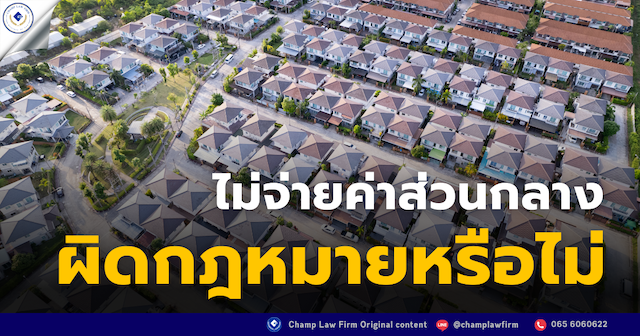สารบัญ
- ค่าส่วนกลาง คืออะไร เก็บไปทำไม
- ไม่จ่ายค่าส่วนกลางหมู่บ้าน มีโทษอะไรบ้าง
- ไม่จ่ายค่าส่วนกลางคอนโด มีโทษอะไรบ้าง
- ไม่จ่ายค่าส่วนกลาง โดนฟ้องได้หรือไม่
ค่าส่วนกลาง คืออะไร เก็บไปทำไม
ค่าส่วนกลาง คือค่าใช้จ่ายที่เราต้องจ่ายให้นิติบุคคลอาคารชุด เพื่อนำไปบริหารจัดการส่วนกลางคอนโดที่ใช้ร่วมกัน
เช่น สระว่ายน้ำ Co-working Space ห้องออกกำลังกาย สวนชั้นดาดฟ้า หรืออื่นๆ แล้วแต่จุดขายของแต่ละโครงการ
โดยจะแบ่งเป็นค่าใช้จ่ายสำหรับส่วนต่างๆ ดังนี้
- ใช้เป็นค่าจ้างในการบริหารพื้นที่ส่วนกลาง และค่าจ้างพนักงานต่างๆ
- ใช้เป็นค่าสาธารณูปโภคพื้นฐาน
- ใช้เป็นค่าดูแลรักษาและซ่อมบำรุง
- ใช้เป็นค่าใช้จ่ายเพื่อกิจกรรมเบ็ดเตล็ดอื่นๆ
ทั้งนี้ก็เพื่อให้บริเวณพื้นที่ส่วนกลางนั้นมีความสวยงาม สะอาดตา ปลอดภัย สามารถใช้ประโยชน์ร่วมกันได้อย่างเต็มที่
และยังช่วยเพิ่มมูลค่าของคอนโดในระยะยาว หากจะอยู่เองก็สบายตา สบายใจ หากจะให้เช่าหรือขายต่อก็ได้กำไรเพิ่มขึ้นอีกด้วย
ไม่จ่ายค่าส่วนกลางหมู่บ้าน มีโทษอะไรบ้าง
กรณีที่เราไม่ยอมชำระค่าส่วนกลางของหมู่บ้านจะมีโทษดังนี้
1. หากเลยกำหนดชำระในวันที่กำหนด
จะต้องเสียค่าเบี้ยปรับการชำระล่าช้าตั้งแต่ 10-15% ของยอดที่ต้องชำระพร้อมดอกเบี้ย ทั้งนี้เบี้ยปรับจะขึ้นอยู่กับข้อกำหนดของนิติบุคคลในแต่ละโครงการ
2. ค้างชำระค่าส่วนกลาง 3 เดือนขึ้นไป
อาจถูกระงับการให้บริการ หรือการใช้สิทธิในสาธารณูปโภคต่างๆ เช่น การถอดสิทธิ์ใช้คีย์การ์ดเข้าออกหมู่บ้าน สิทธิในการไม่บริการเก็บขยะ สิทธิในการเข้าใช้พื้นที่ส่วนกลางต่างๆ ฟิตเนส สระว่ายน้ำ ห้องสมุด ห้องประชุม ฯลฯ
3. ค้างชำระค่าส่วนกลาง 6 เดือน
นิติบุคคลมีอํานาจระงับการจดทะเบียนสิทธิและนิติกรรมในการทำธุรกรรมต่าง ๆ ไม่สามารถโอนกรรมสิทธิ์ซื้อขายใด ๆ ได้
4. ค้างชำระค่าส่วนกลางเกิน 6 เดือน
มีสิทธิ์ถูกส่งยื่นฟ้องศาลได้ (ขึ้นอยู่กับคณะกรรมการ)
ไม่จ่ายค่าส่วนกลางคอนโด มีโทษอะไรบ้าง
ในกรณีที่เราไม่ยอมชำระค่าส่วนกลางของคอนโดจะมีโทษดังนี้
1. หากเลยกำหนดชำระในวันที่กำหนด
หากไม่ชำระภายในวันและเวลาที่แจ้งไปภายในระยะเวลา 6 เดือนจะต้องเสียค่าปรับในอัตราไม่เกิน 12% ทันที และหากมียอดค้างชำระเกิน 6 เดือนขึ้นไป จะต้องเสียค่าปรับในอัตราไม่เกิน 20% ของยอดที่ต้องชำระพร้อมดอกเบี้ย โดยการเรียกเก็บค่าส่วนกลางจะขึ้นอยู่กับรอบการชำระของแต่ละโครงการ ซึ่งจะมีรอบเก็บ 3 เดือน, 6 เดือน หรือ 1 ปี
2. เสียสิทธิการลงคะแนนในที่ประชุม
ผู้ที่ไม่ชำระค่าส่วนกลางจะไม่สามารถมีสิทธิออกเสียงลงคะแนนในเรื่องใดๆ ได้ ถึงแม้จะสามารถเข้าร่วมฟังการประชุมใหญ่ได้ก็ตาม
3. ไม่ได้รับ “ใบปลอดหนี้”
เมื่อมีการซื้อ-ขาย หรือโอนกรรมสิทธิ์ใด ๆ เจ้าของต้องชำระค่าใช้จ่ายค้างชำระทั้งหมด ไม่ว่าจะเป็นค่าน้ำ ค่าไฟ ค่าส่วนกลาง เพื่อขอใบปลอดหนี้จากนิติบุคคลไปใช้เป็นเอกสารประกอบการยื่นเรื่องที่สำนักงานที่ดิน
4. มีสิทธิ์ถูกยื่นเรื่องฟ้องศาลได้ (ขึ้นอยู่กับมติคณะกรรมการ)
ไม่จ่ายค่าส่วนกลาง โดนฟ้องได้หรือไม่
- มีกฎหมายดำเนินการกับผู้ที่ค้างชำระค่าส่วนกลาง โดยตาม พ.ร.บ. จัดสรรที่ดิน (ฉบับที่ 2) พ.ศ. 2558
- กำหนดให้นิติบุคคล ซึ่งเป็นผู้มีอำนาจในการดูแลโครงการ สามารถดำเนินการระงับการให้บริการเจ้าของ
- ห้องชุด/บ้านที่ค้างชำระเงินค่าส่วนกลางได้ รวมถึงสามารถดำเนินคดีตามกฎหมายเพื่อบังคับให้จ่ายได้ด้วย



สอบถามเพิ่มเติม
ติดต่อทนาย
ส่งเมล์
info@champ-lawfirm.com
โทร
065 6060622
แชทไลน์
ID: @champlawfirm
สำนักงาน
47/86 Pattaya Klang Rd.